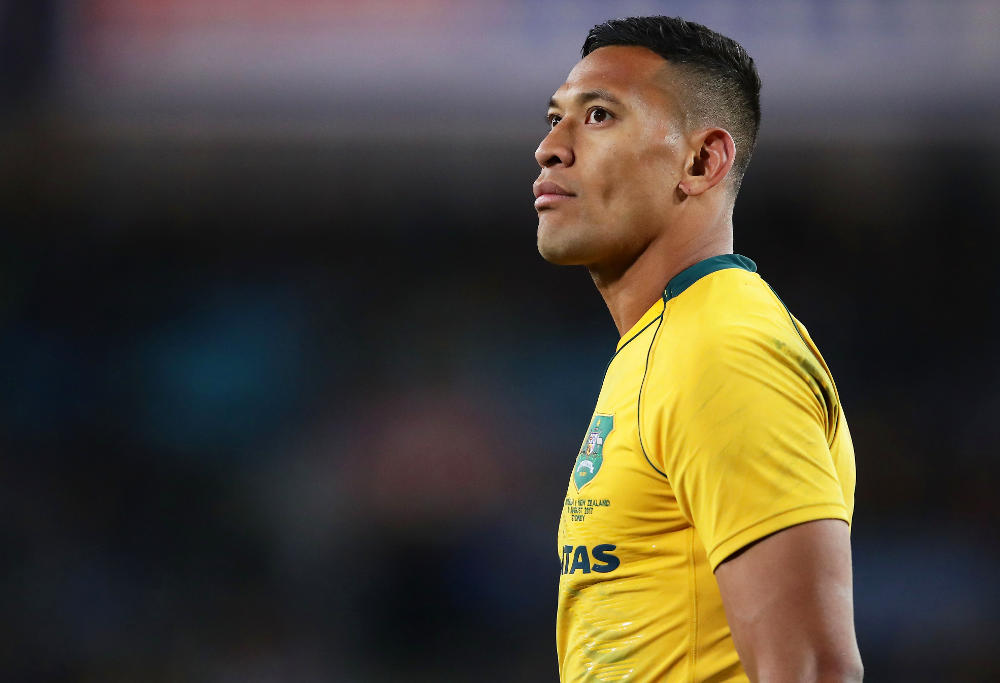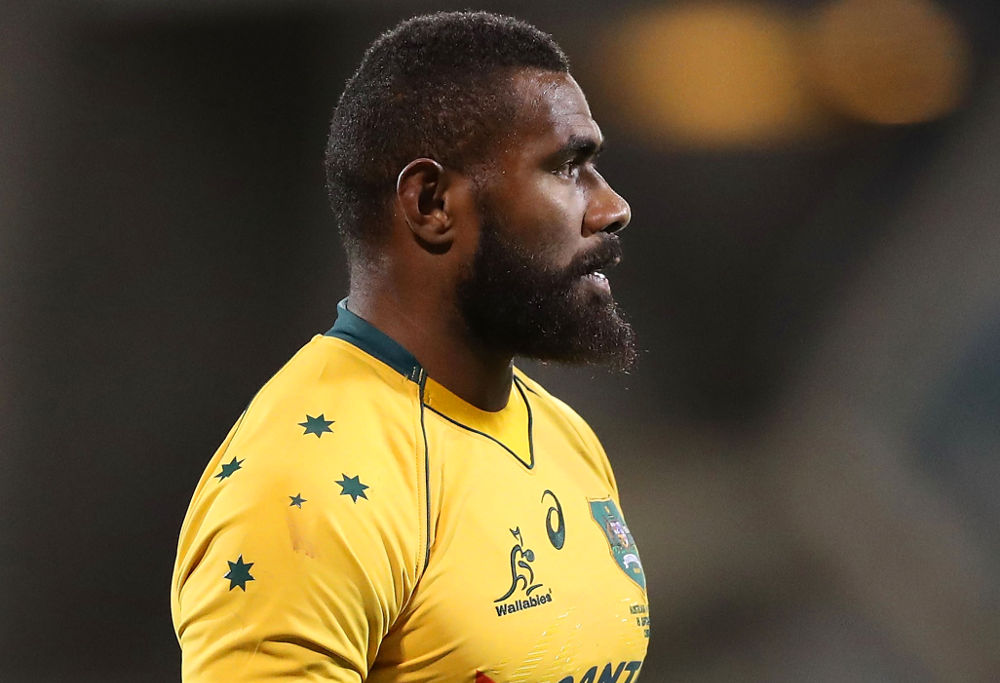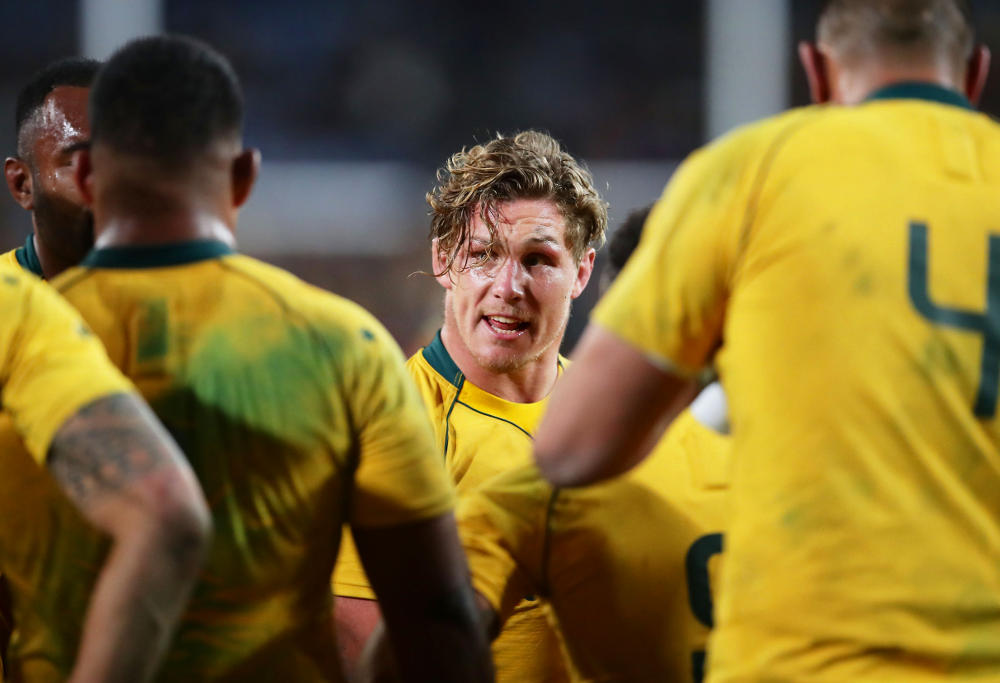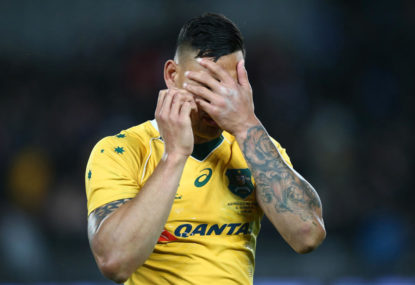Why did Michael Cheika lose his cool at the media conference after the Wallabies pulled off a 27–27 draw against the Springboks at Bloemfontein by claiming that Israel Folau did not pull Dillyn Leyds to the ground by his hair?
There were plenty of positives for the Wallabies coming out the Test. And these positives should have been Cheika’s focus at the after-Test media conference.
Given the dismal record of Wallabies in Tests against the Springboks in South Africa, with only ten Test wins achieved there, a draw was a strong result for the visitors.
The record shows that since 1933 the Wallabies have won only a quarter of their Tests in South Africa against the Springboks
At home, it is a different story. The Wallabies have won 60 per cent of their Tests against Springboks in Australia.
And at Bloemfontein the Wallabies were surging into Springboks territory with time up only to be thwarted by a knock-on that stifled a promising attack.
Cheika should have been explaining that the disappointment in the Test came from his side not clinching a victory that was within their grasp. Instead he went into a stupid defence of Israel Folau’s brain fade of pulling the Springboks winger Dillyn Leyds to the ground by his hair.
Leyds claimed that he was “100 per cent” sure that Folau pulled him down to the ground by his hair. And he was correct to make this claim.
His teammates, who started a brawl that surged over the touch-line, were adamant, too, that this is what had happened.
And most importantly, the video replays showed clearly that Folau started his tackle, dangerously, by pulling on Leyds’ collar, a no-no in itself. Then as his hand slipped off the collar, Folau grabbed a clump of Leyds’ hair.
Instead of immediately releasing his hair-grip, Folau held on tightly and used Leyds’ head as a sort of lever to throw the Springbok to the ground.
The only mistake the New Zealand referee Ben O’Keefe made in adjudicating this incident and its aftermath was to award a penalty to the Springboks rather than a penalty and a yellow card against Folau.

For the life of me, I can’t understand why Cheika wanted to contest the facts of this incident. It is obvious from the replays, and obvious at the time, that Folau grabbed Leyds’ hair and threw him to the ground with his right hand still clinging to the hair.
It is amazing to me that a yellow card was not awarded.
And then to bring the Wallabies captain Michael Hooper into the controversy by allowing him to contradict the video evidence and say that he didn’t see any hair-pulling defies understanding.
Pull the other one, I say.
The point here is that referees around the world have a jaundiced view of the Wallabies and the way coach Cheika dispute decisions in a way that is intended to compromise their integrity.
Is it not understandable that as a group they are taking the approach that the Wallabies are cheats who lie about what is happening on the field?
To be frank, the Wallabies were lucky to have avoided a yellow card for Folau. If one of the French referees had the whistle, the possible yellow might even have been promoted to red. The grounds for this sort of escalation lie in the fact that pulling a runner to ground by his hair exposes that player very much to a broken neck.
The Wallabies were lucky, too, that the video referee did not examine Bernard Foley’s slick inside pass, made while being slammed to the ground, to Folau that set up the Wallabies first try in a dazzling set-piece play.
To my mind and eyes after running the play through several times, Foley’s pass was clearly forward.
Indeed, this sort of play, the inside pass to a runner coming in on an angle, works only when the runner is actually through the hole in the defensive line and on a line that takes him slightly ahead of the passer.
This is what happened with the brilliant Folau try.
The Test was actually well-refereed. There were a couple of passes, from both sides, that seemed to go forward and the call was play on. But the scrums, where the Wallabies did well, were well-refereed. The offside line was strictly policed. And referee O’Keefe was invariably accurate in his adjudications at the ruck and maul.
One of the real talking points, for me, is Folau’s poor tackling technique. The attempt on Leyds could have resulted in a harsher punishment and his miss on Ruan Dreyer when the prop powered forward to score under the posts was poor, also, in a technical sense.
A bonus for the Wallabies was the impressive first-run Test by Marika Koroibete. As a finisher, he is the real thing and the clear and present danger to the opposition that the Wallabies have lacked on the wing since Folau was moved away from this position to fullback and, occasionally, centre.
A finisher like Koroibete on the wing is, in my opinion, like a tennis player complementing a good all-court game with a booming, devastating serve.

Both of Koroibete’s tries might not have been scored by anyone else in the Wallabies squad, including Folau.
Koroibete’s power, pace and positional awareness in setting himself into position to take the pass and convert an attacking movement into a try was the equivalent of a tennis player serving a series of aces to get out of a tight situation.
And if anyone does not believe that a player needed a sort of attacking genius to pull off what Koroibete did, they can only look to Tevita Kuridrani’s poor attempt late in the Test to run over the Springbok halfback Ross Cronje to score what should have been the winning try.
Kuridrani’s hang-dog look after he had been taken to the ground told the story vividly enough. He had blown a great chance to entrench the Wallabies lead with minutes remaining in the Test.
We come now to several strange decisions from skipper Michael Hooper.
In a five-minute period hot on attack, with the scoreline 7–7, Hooper turned down a couple of chances to kick for goal. Ultimately, this option was forced on him when the Springboks gave away yet another penalty, this time in front of their posts.
Then in the last 20 minutes, with the Wallabies leading 27 24, Hooper turned down a penalty shot from just inside Wallaby territory to opt for a kick to touch and a lineout rumble.
This situation cried out for Reece Hodge to kick for goal. If the kick had been successful, and Hodge could easily have made the yardage required in the Bloemfontein altitude, the Springboks would have needed a converted penalty to win the Test.
If the kick had been unsuccessful, the Wallabies were going to get the ball back, a chance to launch another assault on the wilting Springboks defence and possibly forcing another penalty shot.
Hooper has a tendency to opt for the soft option of going for touch rather than taking the penalty. He lost games for the Waratahs with this tendency and, in my view, probably lost the game for the Wallabies by refusing to use the massive and generally accurate Hodge boot for extra long-range shots and Bernard Foley for the shorter shots at goal.
After all, it was a successful Kurtley Beale penalty shot from the halfway sideline that gave the Wallabies a famous victory at Bloemfontein under the coaching of the pragmatic Robbie Deans.
Spiro’s First Law Of Winning Tests At Altitude is this: TAKE THE SHOT!
Going into the Test coach Cheika said that he was trying to expose a number of new players to the Test arena. This is an admirable policy but it depends on Cheika’s eye for potential to be of any great use for the Wallabies.

The performance of the new players suggests that Cheika’s eye is pretty sharp right now. The Wallabies coach deserves a lot of praise for the way he has raided a somewhat empty Super Rugby talent jar and pulled out some potential future stars.
Marika Koroibete, Jack Dempsey, Izack Rodda, and Lukhan Tui all look to be players with long careers in the Wallabies colours ahead of them.
The process has been perhaps a bit slow, perhaps. But the signs are finally flashing the news that coach Cheika is building a youngish, big, talented Wallabies squad that will be competitive in the 2019 Rugby World Cup tournament in Japan.
































































































